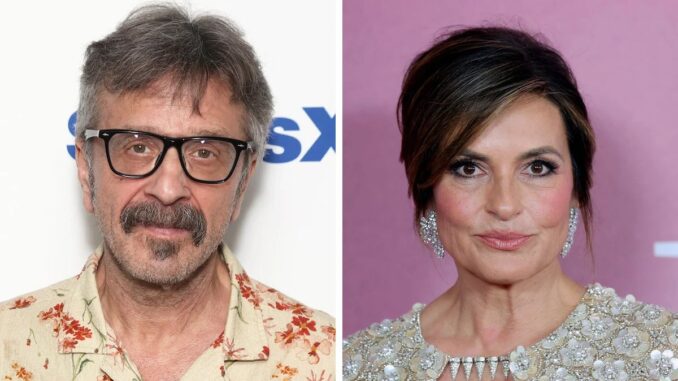
The Invisible Threads: How Mariska Hargitay, Marc Maron, and a Network of Lives Intertwined
Mariska Hargitay, the indomitable Olivia Benson of "Law & Order: SVU," exists in a world of meticulously crafted narratives. For decades, she's navigated the complex tapestry of crime and justice, offering solace and strength to victims. Yet, reality, as it often does, throws a curveball far stranger than any script. The revelation that Marc Maron’s character on the Netflix series "GLOW," the gruff and emotionally unavailable director Sam Sylvia, was loosely based on her brother's father, the legendary bodybuilder Mickey Hargitay, is a testament to the unexpected, often invisible, threads that connect seemingly disparate lives. It highlights the bizarre alchemy of pop culture, the lingering impact of absent fathers, and the enduring, sometimes unsettling, power of familial legacy.
To understand the weight of Hargitay's surprise, one must first consider the layered contexts at play. Mariska's own childhood was marked by the tragic loss of her mother, the iconic actress Jayne Mansfield, in a car accident. This profound absence undoubtedly shaped her perspective on family, loss, and the vulnerabilities inherent in the human experience. She built a career portraying someone who dedicates their life to protecting others, perhaps driven, in part, by a desire to provide the security she herself yearned for.
Then comes Mickey Hargitay, her father, a Mr. Universe who epitomized physical strength and masculine ideal. His flamboyant lifestyle and numerous marriages, including his headline-grabbing union with Mansfield, painted a picture of a man larger than life, a figure both captivating and, potentially, overwhelming. To imagine Mariska, a seasoned actress intimately familiar with the intricacies of human psychology, being unaware of her father's impact on a character played by Marc Maron, is frankly astonishing. It speaks to the vastness of the entertainment industry and the potential for even the most well-connected individuals to remain blissfully ignorant of the creative processes unfolding around them.
Maron's character, Sam Sylvia, is a deeply flawed and cynical figure. He's a washed-up director struggling to recapture past glory, burdened by a deep-seated loneliness and a strained relationship with his estranged daughter. The character, in Maron's own words, drew inspiration from Mickey Hargitay's boisterous personality and flamboyant career. The irony, of course, lies in the fact that Maron, known for his raw honesty and vulnerability on his podcast, "WTF," was channeling the energy of a man connected to Hargitay's own family history.
The impact of absent or emotionally unavailable fathers is a recurring theme in both Hargitay's personal and professional life. Olivia Benson's empathy for victims often stems from a deep understanding of the pain caused by neglect and abuse. Similarly, Sam Sylvia in "GLOW" grapples with the consequences of his own paternal shortcomings. This connection, however indirect, underscores the enduring significance of fatherhood and the lasting repercussions of its presence or absence.
Moreover, the anecdote highlights the often-unacknowledged process of artistic inspiration. Artists draw from their experiences, observations, and even second-hand accounts to create their work. In this instance, Maron, perhaps unintentionally, tapped into a familial history that resonated with themes central to both his and Hargitay's lives. It's a reminder that art doesn't exist in a vacuum; it's a conversation, a collage of influences, and sometimes, a startling revelation of unexpected connections.
Ultimately, Mariska Hargitay's reaction, "I Never Saw That," is a profound statement. It's a reminder that even in a world saturated with information and interconnected narratives, blind spots exist. It speaks to the complexities of family dynamics, the enduring influence of absent figures, and the power of art to reveal hidden truths. More than just a bizarre celebrity anecdote, it’s a window into the intricate web of human experience, where the threads of our lives are often interwoven in ways we never could have imagined, connecting us to stories we never knew were being written. It's a testament to the enduring power of family, the unexpected detours of artistic inspiration, and the ever-present possibility of uncovering a hidden chapter in our own personal narratives.
